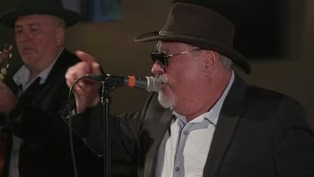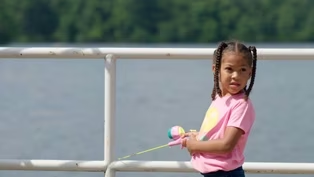
Reducing Harm
Clip: Season 4 Episode 28 | 10m 33sVideo has Closed Captions
Public health experts say supervised drug injection sites can reduce overdoses.
Rhode Island is the first state in the country to legalize harm reduction centers, a place where people can use illicit drugs under the presence of trained staff. It comes as the number of fatal overdoses in the state reaches a record high. Michelle San Miguel takes a second look at the sites and explores when they might officially open.
Problems playing video? | Closed Captioning Feedback
Problems playing video? | Closed Captioning Feedback
Rhode Island PBS Weekly is a local public television program presented by Ocean State Media

Reducing Harm
Clip: Season 4 Episode 28 | 10m 33sVideo has Closed Captions
Rhode Island is the first state in the country to legalize harm reduction centers, a place where people can use illicit drugs under the presence of trained staff. It comes as the number of fatal overdoses in the state reaches a record high. Michelle San Miguel takes a second look at the sites and explores when they might officially open.
Problems playing video? | Closed Captioning Feedback
How to Watch Rhode Island PBS Weekly
Rhode Island PBS Weekly is available to stream on pbs.org and the free PBS App, available on iPhone, Apple TV, Android TV, Android smartphones, Amazon Fire TV, Amazon Fire Tablet, Roku, Samsung Smart TV, and Vizio.
Providing Support for PBS.org
Learn Moreabout PBS online sponsorship- What did you?
- How old are you?
- You do some Fentanyl today?
- No.
- Alright, what'd you do then?
Just tell us what you doing, we need to know how to help you.
- [Reporter] It's a scene that has become increasingly common in Providence and around Rhode Island.
- It's a confirmed overdose.
He's gotten six milligrams of Narcan but he still goes in and outta consciousness.
- [Reporter] A person overdosing on fentanyl.
- We've reduced opioid prescriptions dramatically in the state, we've expanded access to recovery programs and it's still not enough.
- Brandon Marshall says Rhode Island needs to do more to tackle the state's growing opioid crisis.
He's an associate professor in epidemiology at Brown University.
Marshall says the pandemic contributed to a spike in overdoses.
- People have mental health conditions who are experiencing anxiety, depression, for example, have very, very high rates of overdose.
And of course, people with economic instability.
People who are experiencing homelessness or job loss during the pandemic were at very high risk for returning to substance use or, you know, increasing overdose risk.
- [Reporter] Marshall believes supervised drug injection sites, also known as harm reduction centers, can help curb overdoses.
A Rhode Island law that took effect in March allows those facilities to operate in the state during a two-year pilot program.
- Typically, these centers, at least in the United States, would be funded privately so by donations or from other sources.
As far as I'm aware, there are no plans to provide state or local dollars to operate these facilities.
- When first someone enters, they're gonna come up to this registration desk just- - [Reporter] No sites have opened in Rhode Island yet.
Celine Means, an advocacy coordinator at Rhode Island Communities for Addiction Recovery efforts gave us a tour of a mock harm reduction center at the organization's downtown Providence office.
- They will write in their initials or a client ID and what substance and method they will be using.
It's all anonymous.
- [Reporter] People will bring their own drugs to the clinic and use them under the supervision of trained staff.
Employees and volunteers will be able to administer Naloxone to reverse overdoses and can provide drug users with resources for getting clean.
- These are all Rhode Island based resources around recovery, treatment, safe streets, housing, food, shelter.
- There are more than 120 harm reduction centers around the world.
Professor Marshall has spent nearly two decades studying their impact.
- There has actually never been an overdose death at any harm reduction center anywhere in the world because overdoses can be effectively managed on site.
No, we got it, we got it.
Just let it hit the ground.
All right, go all the way down.
All right, that's it, you got it?
- [Reporter] Many overdoses are being treated at hospitals.
Patients who experience an opioid overdose account for 1.9 billion in annual hospital costs nationwide according to the Pew Charitable Trusts.
Not only would harm reduction centers reduce those healthcare costs but Marshall says they would also help get users into treatment.
He points to the first supervised drug injection site to open in Canada back in 2003.
- After about two years of operation, more than 40% of people using the site had entered into some form of treatment, and that's because of those referrals and those pathways that are being provided by connecting people to treatment and recovery in the site itself.
- So once a person's turn has been called, they come over here to a table to grab their supplies.
We give out these supplies such as clean cookers, clean needles, clean water, and fentanyl test strips, all so that you can make sure that your use is safe and clean.
- [Reporter] Rich Holcomb knows firsthand what it's like to be in the throes of addiction.
He's overdosed more than a dozen times.
- He loaded up the needle for me and injected me and within seconds I had completely blacked out.
- [Reporter] Holcomb has walked the road from overdose to recovery.
As the program manager for Project Weber in Providence, he helps men who've engaged in sex work, oftentimes to pay for drugs.
It's a life that he once lived.
Holcomb says the last time he used drugs several years ago, he overdosed.
- I was getting high with a friend of mine.
We were in his apartment, you know, after several years clean and directing the Project Weber program, I relapsed.
I woke up to paramedics around me and didn't know what had just happened and they just said, "You just overdosed."
- [Reporter] In 2020, three in four fatal overdoses in Rhode Island involved fentanyl.
Proponents of injection sites say users would be able to test their substances for fentanyl at those facilities.
- If harm reduction centers existed when you were using, would you have gone to one?
- That's an interesting question and I want to give an honest answer.
I genuinely don't know.
If it was a facility that was run by peers and I trusted those peers, then I think that the chances of me going in a facility like that would be pretty high.
- [Reporter] But not everyone is embracing the concept of regulated injection sites.
State Representative David Place is among the lawmakers who voted against them.
- The worst thing that we could do, in my opinion, for these addicts, which is give them a warm, safe place to shoot up.
- [Reporter] Place represents parts of Gloucester and Burville.
He knows of people in his community who've died of drug overdose, but he doesn't think harm reduction centers are the answer to the opioid crisis.
- It's not me saying, I don't care about addicts.
It's not me saying, I don't want addicts to survive.
It's me saying, we're going about out the wrong way.
- [Reporter] Instead, he says, the conversation should focus on decriminalizing drugs and de-stigmatizing addiction along with reaching out to people who are using drugs.
- Everything that I've seen about treating somebody with addiction, the only way you get them is when they're at rock bottom.
And a lot of those times, unfortunately, unfortunately comes when they've experienced overdose, whether themselves personally or their friends.
- But that rock bottom could be death for some people.
- Yes, it could be.
- [Reporter] While federal law makes it illegal to open a place for the purpose of using a controlled substance, Professor Marshall says he's not worried about the federal government closing future facilities in Rhode Island.
He notes that the first two authorized drug injection sites in the country opened last November in New York City.
- Honestly, we've seen a pretty sudden and dramatic shift in the federal response under the Biden administration.
They've been actively supporting harm reduction, generally, including syringe service programs and Narcan distribution.
They haven't made a formal stance on harm reduction centers yet.
But I haven't seen any indication that they would try to interfere with facilities that will be legal here in Rhode Island under our state law.
- But under federal law would still be illegal.
- That's right, that's right.
But we have other examples where state and federal laws conflict.
A classic example would be cannabis, right, which is legal in many states, but which remains illegal Federally.
- They find bodies in the alley, they find bodies in the abandoned houses and people don't lose no sleep.
- [Reporter] Kevin Montero is a peer recovery specialist.
He works with people who've battled addiction.
He believes injection sites will reduce the number of people who use drugs alone.
- What's wrong with our society?
We accepted the fact that people are gonna die.
We accepted the fact they might die in Kennedy Plaza or they might die behind a store.
- [Reporter] Montero spent 30 years in a Colorado prison for second degree murder that he says centered around drugs.
- The reason why I'm sitting here today is because I actually was guilty of the crime, and once I accepted that and I accepted the fact that I was guilty, I accepted the fact my behavior while I was in solitary confinement, regardless of the time period I was in there, I took responsibility and once I took responsibility, my life changed.
- [Reporter] He believes safe injection sites will be a lifeline for those suffering from addiction.
- Most people that have, and I'm speaking for myself now that have substance use disorder, the primary cause was a broken heart, broken family, just everything in your life.
When you don't have the tools to do what you need and to make decisions, man, you always, most of the time you're going to fall off.
Video has Closed Captions
Clip: S4 Ep28 | 10m 12s | Rhode Island’s relationship with R&B and efforts to make it the state’s official music. (10m 12s)
Video has Closed Captions
Clip: S4 Ep28 | 4m 30s | A man from Coventry is getting kids outdoors by teaching them to fish. (4m 30s)
Providing Support for PBS.org
Learn Moreabout PBS online sponsorship
- News and Public Affairs

Top journalists deliver compelling original analysis of the hour's headlines.

- News and Public Affairs

FRONTLINE is investigative journalism that questions, explains and changes our world.












Support for PBS provided by:
Rhode Island PBS Weekly is a local public television program presented by Ocean State Media

